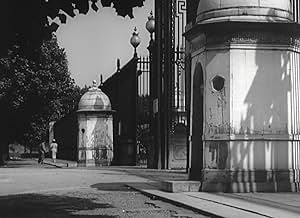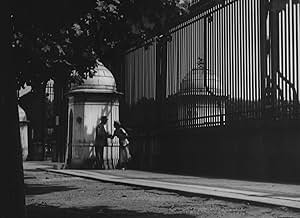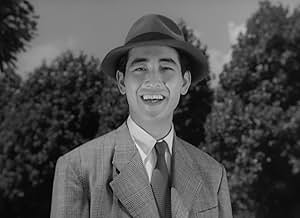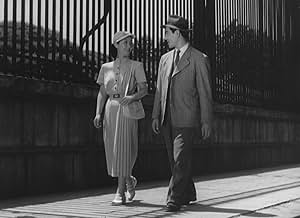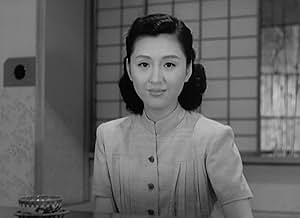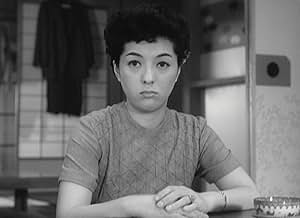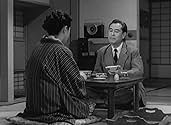IMDb रेटिंग
7.6/10
4.1 हज़ार
आपकी रेटिंग
अपनी भाषा में प्लॉट जोड़ेंA childless middle-aged couple faces a marital crisis.A childless middle-aged couple faces a marital crisis.A childless middle-aged couple faces a marital crisis.
- पुरस्कार
- कुल 1 जीत
फ़ीचर्ड समीक्षाएं
Another sensitive Ozu film about family. In this one, a somewhat upper-class woman resents her more simple, middle-class husband (by arranged marriage), while also encouraging her niece to go to arranged marriage meetings. As always with Ozu, I found an awful lot to like about this movie, but I wasn't quite enamored enough to gush over it. Most of the core cast is superb, although it's not Ozu's usual team (Setsuko Hara is nowhere to be seen, although Chishu Ryu and Chikage Awashima have minor roles). Michiyo Kogure might be a little too nasty, but I have to say it's kind of refreshing to see a less restrained character in an Ozu film. Perhaps the film wraps up too nicely and neatly, going too obviously for a touching moment, but I wouldn't say it's entirely unwarranted. At any rate, I enjoyed the film with its insights and gentle humor.
This is both typical and untypical Ozu - typical in that its a simple story with a typical simple point (but of course told with deceptive skill and complexity), but its unusual in that its set among the upper middle classes, not the 'average' Japanese family of most of his movies.
The story is straightforward - an unhappy marriage between a rich girl and her successful but relatively low born husband. She can't hide her contempt for his dullness and rustic ways. He is unhappy but never argues back, just finds his own little ways of getting pleasure out of life. A series of incidents finds them having an unexpected late night simple meal (green tea over rice is essentially 'leftovers' when nothing else is available) and suddenly she realizes she loves him after all.
As always with Ozu, the richness is in the characters. Taeko, played by Michiyo Kogure is spoiled and insensitive, but a compelling, capricious character. Mokicho (the husband) under his dull salary-man skin is really a sensitive, caring man. The other characters are all vivid and memorable, especially Setsuko, the headstrong niece. There are also wonderful set pieces, usually involving Taekos friends, having little girls nights together, gossiping about their husbands and plotting marriages.
With Ozu a brief overview of his movies always makes him sound dull. But in reality this is funny, moving and compelling. Its not first rate Ozu - the theme of the movie is too straightforward and obvious, the ending a little too neat and tidy. But second rate Ozu is still head and shoulders above almost any other drama. The humanity of the characters shines through, creating a little world we can sink into. The wonder of Ozu is that we are not observing characters, we are sitting with them, in the middle of their lives.
I can't help but compare this to Naruse's 'Repast', another movie about a marriage in trouble, where the wife cannot hide her contempt for her husband, but in the end they both realize why they love each other. Naruse was more of a pessimist, so the reconciliation at the end of Repast is both happy and sad, as the characters realize that that living together, even without a great love, is better than being lonely. In Ozu's more traditional world, the couple (product of an arranged marriage) eventually find love, even after many years of marriage by the acceptance of each others little foibles. Taeko learns that simple things can be as pleasurable as luxury. It seems a little trite, and it would be in another film makers hands, but somehow Ozu finds depths of wisdom even in such clichés.
The irony is that Ozu was a lifelong bachelor, yet he made perhaps the best movies ever made at examining families in detail. If I had my way I'd put this movie and 'Repast' as compulsive viewing for all engaged couples. It would be more effective than any pre-marriage course!
The story is straightforward - an unhappy marriage between a rich girl and her successful but relatively low born husband. She can't hide her contempt for his dullness and rustic ways. He is unhappy but never argues back, just finds his own little ways of getting pleasure out of life. A series of incidents finds them having an unexpected late night simple meal (green tea over rice is essentially 'leftovers' when nothing else is available) and suddenly she realizes she loves him after all.
As always with Ozu, the richness is in the characters. Taeko, played by Michiyo Kogure is spoiled and insensitive, but a compelling, capricious character. Mokicho (the husband) under his dull salary-man skin is really a sensitive, caring man. The other characters are all vivid and memorable, especially Setsuko, the headstrong niece. There are also wonderful set pieces, usually involving Taekos friends, having little girls nights together, gossiping about their husbands and plotting marriages.
With Ozu a brief overview of his movies always makes him sound dull. But in reality this is funny, moving and compelling. Its not first rate Ozu - the theme of the movie is too straightforward and obvious, the ending a little too neat and tidy. But second rate Ozu is still head and shoulders above almost any other drama. The humanity of the characters shines through, creating a little world we can sink into. The wonder of Ozu is that we are not observing characters, we are sitting with them, in the middle of their lives.
I can't help but compare this to Naruse's 'Repast', another movie about a marriage in trouble, where the wife cannot hide her contempt for her husband, but in the end they both realize why they love each other. Naruse was more of a pessimist, so the reconciliation at the end of Repast is both happy and sad, as the characters realize that that living together, even without a great love, is better than being lonely. In Ozu's more traditional world, the couple (product of an arranged marriage) eventually find love, even after many years of marriage by the acceptance of each others little foibles. Taeko learns that simple things can be as pleasurable as luxury. It seems a little trite, and it would be in another film makers hands, but somehow Ozu finds depths of wisdom even in such clichés.
The irony is that Ozu was a lifelong bachelor, yet he made perhaps the best movies ever made at examining families in detail. If I had my way I'd put this movie and 'Repast' as compulsive viewing for all engaged couples. It would be more effective than any pre-marriage course!
Its about a rich family and arranged marriages. Taeko is in an arranged marriage which is not so successful, they communicate very badly and she lies to get out and do fun things with her friends. For her it is easy to lie to the husband as she thinks he is very stupid. Her niece don't want to go on a arranged marriage meet, but decide for herself who she wants to marry probably a sign of the times, the transition from traditional to modern Japan. In other ways also the modern is juxtaposed with the traditional, they wear kimonos as naturally as western style clothes. And her sister is working in a top position as a designer.
As another IMDb reviewer said this is most interesting because of the charming characters. The elegant, but a bit arrogant and selfish Satake Taeko (Kogure Michiyô) had me spellbound from beginning to end. All characters are interesting and the interaction and communication between them make up the movie.
The city itself takes up a small role in the movie as well, something I like a lot. Editing also is very clever at times. Its never ordinary or dull.
As another IMDb reviewer said this is most interesting because of the charming characters. The elegant, but a bit arrogant and selfish Satake Taeko (Kogure Michiyô) had me spellbound from beginning to end. All characters are interesting and the interaction and communication between them make up the movie.
The city itself takes up a small role in the movie as well, something I like a lot. Editing also is very clever at times. Its never ordinary or dull.
Ozu marriage stories are one of the best ones. He really hits you with his deep and truthful dialogues. I loved the cinematography and the use of shadows. Also, I got hungry watching this.
Japanese master Yasujiro Ozu made this 1952 film between two masterpieces, Early Summer and (especially) Tokyo Story, and this film suffers a bit by comparison with them. As in other (somewhat more accomplished) movies by Ozu (one thinks especially of the superb Late Spring) the plot deals on the issue of whether a young woman should marry, and if that marriage should be a love marriage or arranged one. There is a middle aged, childless couple, the snobbish, nasty Taeko (Michiyo Kogure) and her husband, the honest, good but a bit dull salary man Satake (Shin Saburi). Her nephew, the pretty young Setsuko (Keiko Tsushima) comes to visit, she has to go to an interview for an arranged marriage, but seeing the loveless marriage between Taeko and Satake, and how she mocks him behind his back, is not very interested.
Ozu's best films haven't dated a bit, but this one has somewhat. Moreover, while I don't agree with the generalization that all of Ozu's films are slow (not all of them are), this one is on the leisurely paced side. What's more, the movie takes some time to develop its plot so it does require a bit of patience from the viewer. You will eventually warm up to this movie, I think, but not immediately.
On the plus side, it is a good, interesting movie, with believable, well developed characters. Chishu Ryu, Chikage Awashima and Kumiko Mikaye (all regular of many Ozu films) have bit roles here.
Ozu's best films haven't dated a bit, but this one has somewhat. Moreover, while I don't agree with the generalization that all of Ozu's films are slow (not all of them are), this one is on the leisurely paced side. What's more, the movie takes some time to develop its plot so it does require a bit of patience from the viewer. You will eventually warm up to this movie, I think, but not immediately.
On the plus side, it is a good, interesting movie, with believable, well developed characters. Chishu Ryu, Chikage Awashima and Kumiko Mikaye (all regular of many Ozu films) have bit roles here.
क्या आपको पता है
- ट्रिवियाAt the start of the film, two characters mention going to see a new film with Jean Marais. The film was most likely Orphée (1950), which was released in Japan in June 1951.
- भाव
Taeko Satake: Think well before you pick your groom, it's important.
- कनेक्शनFeatured in David Bordwell on 'The Flavor of Green Tea Over Rice' (2019)
- साउंडट्रैकLove's Old Sweet Song
Composed by J.L. Molloy (as James Lyman Molloy)
टॉप पसंद
रेटिंग देने के लिए साइन-इन करें और वैयक्तिकृत सुझावों के लिए वॉचलिस्ट करें
- How long is The Flavor of Green Tea Over Rice?Alexa द्वारा संचालित
विवरण
- रिलीज़ की तारीख़
- कंट्री ऑफ़ ओरिजिन
- भाषा
- इस रूप में भी जाना जाता है
- The Flavor of Green Tea Over Rice
- फ़िल्माने की जगहें
- उत्पादन कंपनी
- IMDbPro पर और कंपनी क्रेडिट देखें
- चलने की अवधि
- 1 घं 56 मि(116 min)
- रंग
- ध्वनि मिश्रण
- पक्ष अनुपात
- 1.37 : 1
इस पेज में योगदान दें
किसी बदलाव का सुझाव दें या अनुपलब्ध कॉन्टेंट जोड़ें

